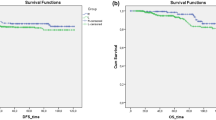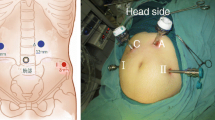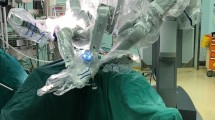Abstract
Background
Robotic total mesorectal excision (RTME), a novel approach for the treatment of rectal cancer, has been shown in previous studies to be safe and effective. However, the results of this approach compared with laparoscopic total mesorectal excision (LTME) have not been reported in terms of clinical outcome and oncologic data. This study compared early outcomes for rectal cancer between two groups.
Methods
Between April 2003 and March 2009, 82 patients from a prospectively maintained database were enrolled in a case-matched study. The patients were matched for gender, age, body mass index (BMI), and type of operative procedure.
Results
Neoadjuvant chemoradiotherapy was performed for 33 RTME patients (80.5%) and 18 LTME patients (43.9%) (p = 0.001). The mean operative time was 296 min for RTME and 315 min for LTME (p = 0.357). The number of conversions were 3 (7.3%) for RTME and 9 (22%) for LTME (p = 0.12). The anastomotic leak rate after surgery did not differ between RTME (n = 3, 8.6%) and LTME (n = 1, 2.9%) (p = 0.62). The mean number of harvested lymph nodes was 13.1 with RTME and 16.2 with LTME (p = 0.07), and negative distal resection margins (DRMs) were noted in all surgical specimens. Positive circumferential resections (CRMs) were identified in 2.4% of the RTME cases and 4.9% of the LTME cases. No difference was noted in lengths of the DRMs, times until a liquid diet, or postoperative hospital stays. The total hospitalization costs were higher in the RTME group, although the difference did not reach statistical significance. There was no operative mortality or port-site recurrence in either group.
Conclusion
For rectal cancer, RTME may be as feasible and safe as LTME in terms of technical and oncologic issues. Further prospective randomized trials are necessary for conclusions to be drawn concerning definite oncologic outcomes of robotic procedures for rectal cancer.
Similar content being viewed by others
References
COST Study Group (2004) A comparison of laparoscopically assisted and open colectomy for colon cancer. N Engl J Med 350:2050–2059
Guillou PJ, Quirke P, Thorpe H, Walker J, Jayne DG, Smith AM, Heath RM, Brown JM (2005) Short-term end points of conventional versus laparoscopic-assisted surgery in patients with colorectal cancer (MRC CLASICC trial): multicentre, randomised controlled trial. Lancet 365:1718–1726
Ballantyne GH (2002) Robotic surgery, telerobotic surgery, telepresence, and telementoring: review of early clinical results. Surg Endosc 16:1389–1402
Pigazzi A, Ellenhorn JD, Ballantyne GH, Paz IB (2006) Robotic-assisted laparoscopic low anterior resection with total mesorectal excision for rectal cancer. Surg Endosc 20:1521–1525
Baik SH, Ko YT, Kang CM, Lee WJ, Kim NK, Sohn SK, Chi HS, Cho CH (2008) Robotic tumor-specific mesorectal excision of rectal cancer: short-term outcome of a pilot randomized trial. Surg Endosc 22:1601–1608
Hellan M, Anderson C, Ellenhorn JD, Paz B, Pigazzi A (2007) Short-term outcomes after robotic-assisted total mesorectal excision for rectal cancer. Ann Surg Oncol 14:3168–3173
Baik SH, Lee WJ, Rha KH, Kim NK, Sohn SK, Chi HS, Cho CH, Lee SK, Cheon JH, Ahn JB, Kim WH (2008) Robotic total mesorectal excision for rectal cancer using four robotic arms. Surg Endosc 22:792–797
D’Annibale A, Morpurgo E, Fiscon V, Trevisan P, Sovernigo G, Orsini C, Guidolin D (2004) Robotic and laparoscopic surgery for treatment of colorectal diseases. Dis Colon Rectum 47:2162–2168
Spinoglio G, Summa M, Priora F, Quarati R, Testa S (2008) Robotic colorectal surgery: first 50 cases experience. Dis Colon Rectum 51:1627–1632
Barlehner E, Benhidjeb T, Anders S, Schicke B (2005) Laparoscopic resection for rectal cancer: outcomes in 194 patients and review of the literature. Surg Endosc 19:757–766
Leung KL, Kwok SP, Lam SC, Lee JF, Yiu RY, Ng SS, Lai PB, Lau WY (2004) Laparoscopic resection of rectosigmoid carcinoma: prospective randomised trial. Lancet 363:1187–1192
Morino M, Toppino M, Bonnet G, del Genio G (2003) Laparoscopic adjustable silicone gastric banding versus vertical banded gastroplasty in morbidly obese patients: a prospective randomized controlled clinical trial. Ann Surg 238:835–841 discussion 841–832
Ng KH, Ng DC, Cheung HY, Wong JC, Yau KK, Chung CC, Li MK (2009) Laparoscopic resection for rectal cancers: lessons learned from 579 cases. Ann Surg 249:82–86
Staudacher C, Vignali A, Saverio DP, Elena O, Andrea T (2007) Laparoscopic vs open total mesorectal excision in unselected patients with rectal cancer: impact on early outcome. Dis Colon Rectum 50:1324–1331
Ito M, Sugito M, Kobayashi A, Nishizawa Y, Tsunoda Y, Saito N (2009) Influence of learning curve on short-term results after laparoscopic resection for rectal cancer. Surg Endosc 23:403–408
Braga M, Frasson M, Vignali A, Zuliani W, Capretti G, Di Carlo V (2007) Laparoscopic resection in rectal cancer patients: outcome and cost-benefit analysis. Dis Colon Rectum 50:464–471
Lee GJ, Lee JN, Oh JH, Baek JH (2008) Midterm results of laparoscopic surgery and open surgery for radical treatment of colorectal cancer. J Korean Soc Coloproctol 24:373–379
Enker WE, Merchant N, Cohen AM, Lanouette NM, Swallow C, Guillem J, Paty P, Minsky B, Weyrauch K, Quan SH (1999) Safety and efficacy of low anterior resection for rectal cancer: 681 consecutive cases from a specialty service. Ann Surg 230:544–552 discussion 552–544
Heald RJ, Moran BJ, Ryall RD, Sexton R, MacFarlane JK (1998) Rectal cancer: the Basingstoke experience of total mesorectal excision, 1978–1997. Arch Surg 133:894–899
Bretagnol F, Lelong B, Laurent C, Moutardier V, Rullier A, Monges G, Delpero JR, Rullier E (2005) The oncological safety of laparoscopic total mesorectal excision with sphincter preservation for rectal carcinoma. Surg Endosc 19:892–896
Kim SH, Park IJ, Joh YG, Hahn KY (2006) Laparoscopic resection for rectal cancer: a prospective analysis of thirty-month follow-up outcomes in 312 patients. Surg Endosc 20:1197–1202
Aziz O, Constantinides V, Tekkis PP, Athanasiou T, Purkayastha S, Paraskeva P, Darzi AW, Heriot AG (2006) Laparoscopic versus open surgery for rectal cancer: a meta-analysis. Ann Surg Oncol 13:413–424
Jayne DG, Brown JM, Thorpe H, Walker J, Quirke P, Guillou PJ (2005) Bladder and sexual function following resection for rectal cancer in a randomized clinical trial of laparoscopic versus open technique. Br J Surg 92:1124–1132
Quah HM, Jayne DG, Eu KW, Seow-Choen F (2002) Bladder and sexual dysfunction following laparoscopically assisted and conventional open mesorectal resection for cancer. Br J Surg 89:1551–1556
Acknowledgments
The authors thank Silvia R. da Costa, Ph.D, for revising and editing the manuscript.
Disclosures
Jeong-Heum Baek, Carlos Pastor, Alessio Pigazzi have no conflicts of interest or financial ties to disclose.
Author information
Authors and Affiliations
Corresponding author
Rights and permissions
About this article
Cite this article
Baek, JH., Pastor, C. & Pigazzi, A. Robotic and laparoscopic total mesorectal excision for rectal cancer: a case-matched study. Surg Endosc 25, 521–525 (2011). https://doi.org/10.1007/s00464-010-1204-x
Received:
Accepted:
Published:
Issue Date:
DOI: https://doi.org/10.1007/s00464-010-1204-x




